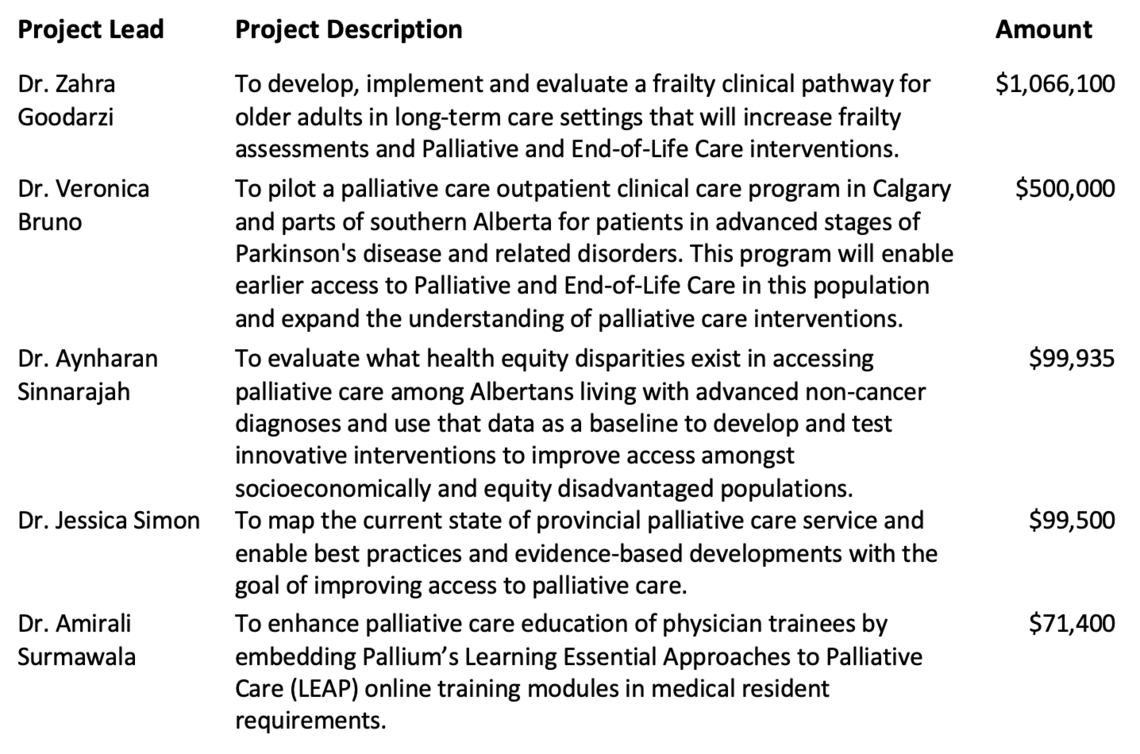Aug. 30, 2022
New research seeks to enhance palliative and end-of-life care

Five University of Calgary researchers working to improve the quality of life for patients in palliative and end-of-life care are receiving provincial government funding to expand their research.
The Government of Alberta is providing $1.8 million for five projects designed to enhance access and delivery of palliative and end-of-life care. On Thursday, Health Minister Jason Copping announced a total of $11.3 million in grant funding for 25 projects across the province.
“These grants will help provide more and better palliative care, ensuring Albertans diagnosed with a life-limiting illness are treated with compassion and respect. We’re delivering on a promise we made to Albertans in 2019 as part of our larger commitment to strengthen our publicly funded health system. We’re thankful for the health-care providers, researchers, educators, community organizations and volunteers that make compassionate care a truly ‘whole of society’ effort,” Copping said at the news conference.

From left, Jason Copping, Jayna Holroyd-Leduc, and Todd Anderson, dean of the Cumming School of Medicine, at the press conference.
Riley Brandt, University of Calgary
“The University of Calgary’s Cumming School of Medicine and research strategies are focused on meeting the needs of Alberta’s health-care system,” says Dr. Ed McCauley, president and vice-chancellor, University of Calgary.
“Today’s funding announcement for palliative care supports our most vulnerable citizens. Like all investments into medical research, this translates into better frontline care for our community in the future, and I thank the Government of Alberta for its commitment to funding this important research.”
The projects receiving funding were selected following a public engagement process with Albertans about palliative and end-of-life care, led by MLA Dan Williams, between October 2020 and June 2021.
Support from individuals in long-term care
One of the projects getting funding is seeking to enhance the support offered to individuals in long-term care. It was designed following consultations with patients and family members.
“Access to co-ordinated and compassionate palliative care improves the quality of life and preserves the dignity of long-term care residents and their families facing life-threatening illness, through the prevention and relief of suffering,” says Dr. Zahra Goodarzi, BHSc’07, MD’10, MSc’16, a geriatrician and assistant professor in the departments of Medicine and Community Health Sciences.
In medical terms, frailty refers to a life-limiting condition, with increased likelihood of comorbidity and illness trajectory that is unpredictable and more susceptible to health declines.
“When diagnosed early, frailty is amenable to interventions to delay decline progression or reduce symptom burden," says Dr. Jayna Holroyd-Leduc, MD, a geriatrician, professor and head of the Department of Medicine.
“Frailty is currently under-diagnosed in long-term care,” says Holroyd-Leduc. “This research will support early recognition of frailty, and early palliative care as is appropriate to the individuals degree of frailty.”

Zahra Goodarzi is a member of the Cumming School of Medicine’s O’Brien Institute for Public Health and Hotchkiss Brain Institute.
Jayna Holroyd-Leduc is the academic lead of the O’Brien Institute’s Brenda Strafford Centre on Aging and the UCalgary Brenda Strafford Chair in Geriatric Medicine. She is co-lead of the project with Goodarzi.
Alberta Health press release: Increasing funding for palliative and end-of-life care




